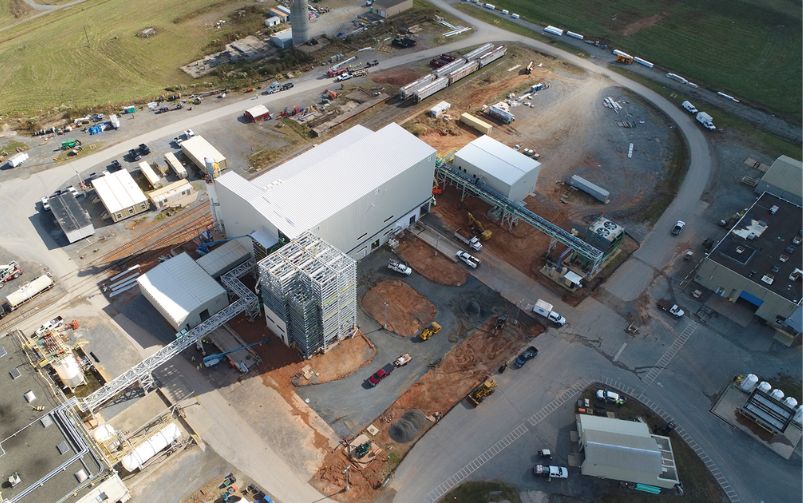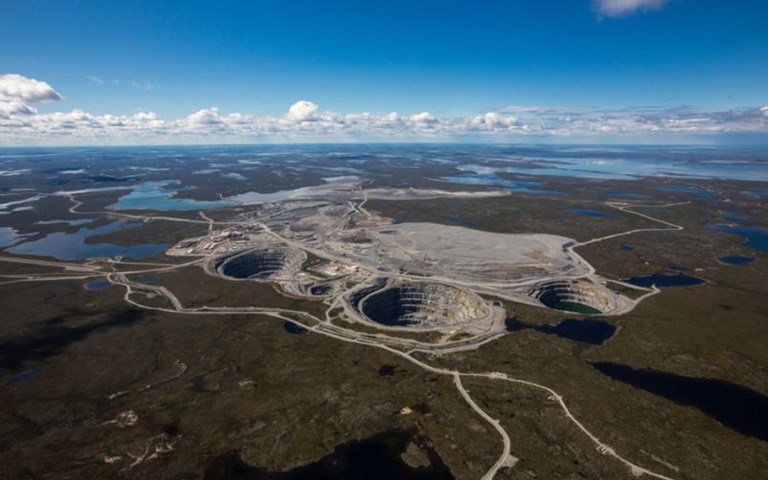Burgundy Diamond Mines proposed a purchase of the Ekati diamond mine in the Northwest Territories as part of a $187 million acquisition of the shares of the mine's parent company, Arctic Canadian Diamond Company Ltd. Courtesy of Arctic Canadian Diamond Company.
Welcome back to your weekly mining news recap, where we catch you up on some of the news you may have missed. This week’s headlines include the resumption of port operations for First Quantum, the development of Canadian supply chains for battery metals and new contractors for the Jansen mine.
Rio Tinto commenced underground production at its Oyu Tolgoi copper mine in Mongolia on Monday. Following the settlement of an earlier dispute with the Mongolian government, and the blasting of 30 drawbells the company has now moved on to the production stage of its block caving operation. Oyu Tolgoi, which is mined from both the surface and underground, is expected to be the fourth-largest copper mine in the world by 2030 with the underground expansion.
First Quantum Minerals’ operations at the port of Punta Rincon in Panama have been given the green light by the country’s Maritime Authority, as reported by Reuters. A source at the Maritime Authority confirmed the suspension, which began Jan. 26, has been lifted. First Quantum said it would be able to quickly resume business at the port and has agreed to a new contract on the operations of its Cobre Panama mine with the Panamanian government.
Australia-based Burgundy Diamond Mines plans to buy the Ekati diamond mine in the Northwest Territories as part of its $187 million acquisition of all Arctic Canadian Diamond Company Limited’s shares, as reported by CBC News. Burgundy CEO Kim Truter said the company is “very confident” it can extend the mine’s life to meet the high demand for Canadian diamonds, and for Ekati’s yellow diamonds in particular. The deal with Arctic Canadian is expected to close in late April.
Indigenous communities have gained experience negotiating with mining companies, often working with impact benefits agreement (IBA) teams to ensure agreements satisfy their particular set of needs. In a recent CIM Magazine feature, writer Dinah Zeldin explores what one experienced negotiator identifies as a shift towards more complex, detailed and individually tailored arrangements.
BHP announced a handful of contracts for its Jansen potash project in Saskatchewan, with local First Nations among the chosen contractors, as reported by Global News. The $86 million multi-year contract to provide services to the Jansen Discovery Lodge — the camp for workers building Jansen Stage 1 — went to Wicehtowak Frontec Services, a partnership between ATCO Frontec Services and the George Gordon First Nation’s development corporation. Concrete work for four main non-process buildings and general site services contracts, worth over $170 million went to 2Nations Bird, a collaboration between Bird Construction and a pair of First Nations development corporations. Production at Jansen is expected to start in 2026.
It’s been a big week for Canadian battery news. Volkswagen picked St. Thomas, Ontario to be the home of its first battery cell plant outside of Europe, as reported by Reuters. And according to Japan’s industry minister, Japan and Canada are in talks to build “strong" battery metals supply chains, also reported by Reuters. Canada’s access to important battery metals such as lithium, nickel and cobalt along with its market access to the U.S. are expected to make it a critical hub for supply chains as countries work towards reaching carbon neutrality by 2050.
Norcat and its technology partners launched a Canada-wide competition to create applications for 5G in the global mining industry, as reported by Canadian Mining Journal. The Mining Technology Innovation challenge invites start-ups and entrepreneurs to submit proof-of-concept ideas with a chance of pitching them to leaders from Canadian technology and mining companies and securing funding to prove out their concepts.
BHP is potentially facing a US$44 billion lawsuit in London, UK over the 2015 Samarco tailings dam collapse in Brazil after the number of claimants in the class action more than tripled to reach 700,000, as reported by Mining.com. The lawsuit, which initially started with 200,000 claimants, was thrown out in 2020, but a July Court of Appeal ruling allowed it to go ahead. The Samarco disaster killed 19 people and released more than 40 million cubic metres of mud and mining waste. BHP denies liability and has moved to add joint venture partner Vale to the case. Vale plans to contest any alleged liability.
That’s all for this week. If you’ve got feedback, you can always reach us at editor@cim.org. If you’ve got something to add, why not join the conversation on our Facebook, Twitter, LinkedIn, or Instagram pages?




